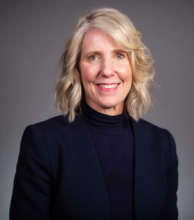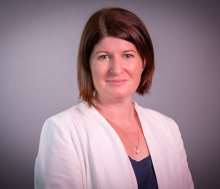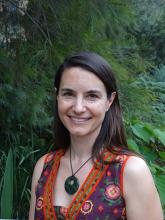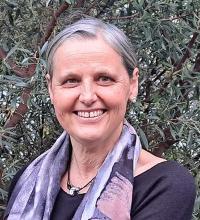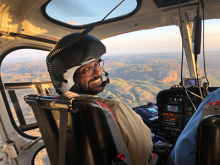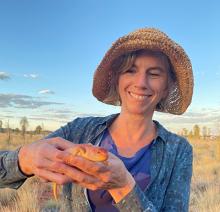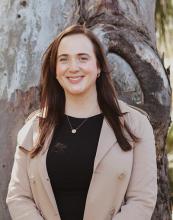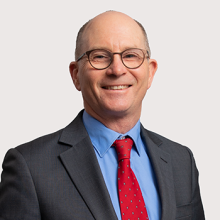
Exercise Volare occurred in August - September 2024, as a series of 3 scenario-based discussions, exercises focused on a hypothetical detection of H5N1 high pathogenicity avian influenza (HPAI) clade 2.3.4.4b (further referred to as H5 HPAI) in Australian wildlife.
These exercises aimed to improve preparedness across agriculture, environment, health portfolios and respective stakeholders to manage future HPAI outbreaks, and more specifically to inform the management of H5 HPAI across wildlife, livestock industries and health.
The broad objectives of the exercise were:
- Raise participant awareness of the HPAI situation globally, and the risks and likely consequences of H5 HPAI entering Australia.
- Explore roles and responsibilities, and authority of Australian and jurisdictional government agencies in a coordinated response to a detection of H5 HPAI in wildlife in Australia.
- Explore public information and crisis communication:
- Identify possible community concerns to a detection of H5 HPAI in Australia, actions to mitigate.
- Explore public and sector-specific stakeholder information needs, roles and responsibilities to achieve unity of effort.
- Technical response to detection of H5 in various animal species.
Exercises like this are an established part of our national preparedness and capability arrangements to respond to biosecurity emergencies such as HPAI outbreaks.
Exercise Volare Findings
The exercise was a successful example of collaboration between agriculture, environment, health and emergency management portfolios at the national level, as we take a whole of government and ‘One Health’ approach to this cross-sectoral threat.
Several key themes and opportunities were identified from the discussions during the Exercise Volare activities. These are aimed at strengthening Australia’s preparedness and response capabilities for H5N1 HPAI. The findings and themes from the Exercise have helped inform a set of preparedness actions, along with funding recently announced by the Australian Government.
The below summary report placemat of Exercise Volare outlines the key themes, opportunities and preparedness actions from the exercise.
Download
Exercise Volare summary report placemat (PDF 371 KB)
Exercise Volare summary report placemat (PPTX 335 KB)
If you have difficulty accessing these files, visit web accessibility for assistance.
Exercise Volare webinar: strengthening Australia’s preparedness for high pathogenic avian influenza was held on 4 October 2024 to share information on the global HPAI situation and learnings from the Exercise Volare series.
Over 1000 stakeholders across a broad range of government, non-government and industry sectors were in attendance. The recording of the webinar and related materials are below.
Webinar recording and materials
Download transcript
Exercise Volare: Strengthening Australia’s preparedness for high pathogenic avian influenza webinar transcript (PDF 304 KB)
Exercise Volare: Strengthening Australia’s preparedness for high pathogenic avian influenza webinar transcript (DOCX 108 KB)
Download summary
Exercise Volare webinar summary (PDF 331 KB)
Exercise Volare webinar summary (DOCX 394 KB)
If you have difficulty accessing these files, visit web accessibility for assistance.
Webinar presenters
Justine Saunders APM - Deputy Secretary, Department of Agriculture Fisheries and Forestry
Justine Saunders APM is the Deputy Secretary of the Biosecurity, Operations and Compliance Group, where she is leading a diverse workforce to strengthen our national biosecurity system in preventing, responding and recovering from pests and diseases that threaten the economy, agricultural production and trade, and the environment.
Previously, as Chief Operating Officer at Home Affairs, she led the full suite of corporate and assurance services to support the achievement of government outcomes.
Justine also acted in the role of Coordinator-General of the National Recovery and Resilience Agency and led the establishment of the National Emergency Management Agency in 2022.
Justine was previously a member of the Australian Federal Police, including ACT Chief of Policing from 2016-2018.
Justine holds a Master of Leadership and Management (Policing), a Bachelor of Social Sciences (Policing Studies) with Distinction, and a Graduate Certificate in Applied Management.
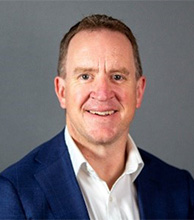
Webinar Facilitator: Dr Brant Smith – First Assistant Secretary - Biosecurity Animal, Department of Agriculture, Fisheries and Forestry
Dr Smith is the head of the Biosecurity Animal Division within the Department of Agriculture, Fisheries and Forestry, is the National Animal Disease Preparedness Coordinator and is leading the inter-agency HPAI Taskforce. In this role he is a key media spokesperson for HPAI and other emergency animal diseases for DAFF.
Dr Smith has a Masters in Veterinary Public Health and Management along with 20 years of experience across the private sector as a large animal veterinarian and within senior executive positions throughout government. This experience ranges from managing the Indigenous Ranger and Indigenous Protected Areas programs in NIAA, within PM&C advising on agricultural and environment matters and senior roles in jointly managed national parks in Parks Australia within the Environment portfolio.
Dr Beth Cookson - Australian Chief Veterinary Officer, Department of Agriculture Fisheries and Forestry
Beth Cookson was appointed Australia’s Chief Veterinary Officer in December 2023. Beth has more than 15 years’ experience in biosecurity policy and operational roles in the Department of Agriculture, Fisheries and Forestry. Her interests include enhancing international trade markets and access, strengthening animal health system nationally and internationally, and has a special focus on biosecurity across northern Australia. Beth is a member of the Australian and New Zealand College of Veterinary Scientists and was awarded an Executive Master of Public Administration through the Australia and New Zealand School of Government (ANZSOG).
Joe Buffone PSM - Emergency Management and Response Group, Deputy Coordinator-General
Joe is the Deputy Coordinator General of the Emergency Management and Response Group of the National Emergency Management Agency (NEMA). He previously held the position of Director General of Emergency Management Australia (EMA) since October 2020 having been with EMA since December 2016 and had held multiple roles within the organisation. As Deputy Coordinator General, Joe is responsible for overseeing the Australian Government National Situation Room and Coordination of Australian Government Disaster Assistance (non-financial).
Joe has more than 30 years’ experience in security and disaster management and has held a number of key senior positions. Joe has held several senior executive positions over the past 15 years, such as Chief Officer of the Victorian Country Fire Authority, Deputy Emergency Management Commissioner Victoria, Deputy Emergency Services Commissioner, Victoria. Joe has also served in the Australian Defence Force. Joe holds a Masters of Business, Graduate Diploma in Disaster Management, and a Diploma in Security Management.
Tiggy Grillo – IUCN SSC Wildlife Health Specialist Group Co-Chair
Speaker Bio: Tiggy Grillo is a veterinarian working, and the National Coordinator and COO at Wildlife Health Australia, where she has been based almost 15 years. She is interested in in connecting people and organisations through positive, mutually beneficial partnerships to support wildlife health, One Health and biodiversity. Tiggy is Australia's World Organisation for Animal Health (WOAH) Focal Point for Wildlife Health and Co-Chair of the IUCN SSC Wildlife Health Specialist Group.
Dr Simone Vitali – Program Manager: Emergencies, Wildlife Health Australia
Simone is the Program Manager for Emergencies with Wildlife Health Australia (WHA), the coordinating body for wildlife health in Australia, which acts to protect and enhance the natural environment through a strong One Health focus. Simone is a veterinarian who worked in the zoo industry for over 20 years and has been involved in wildlife veterinary conservation projects for a range of species. Simone has been involved in developing state and national strategies and procedures for a broad spectrum of wildlife health issues, including emergency diseases, oiled wildlife, bushfires, marine mammal strandings, and disease risk analysis.
Dr Bertie Hennecke - Australian Chief Environmental Biosecurity Officer, Department of Agriculture Fisheries and Forestry
Dr Bertie Hennecke is the Australian Chief Environmental Officer (ACEBO) in the Department of Agriculture, Fisheries and Forestry. Before being appointed as the ACEBO, he held senior leadership roles in the Australian Bureau of Agricultural and Resource Economics and Sciences (ABARES) and in several of the department’s plant biosecurity areas leading and implementing plant health policies.
Dr Hennecke joined the Department of Agriculture, Fisheries and Forestry in 2010 and has a background in natural resource management, invasive species, and agricultural sciences with nearly 30 years of experience in the public service and academia in Australia. He holds a PhD in Botany and a Master of International Agriculture.

Carmel Curran - Assistant Secretary - Communication and Media, Department of Agriculture, Fisheries and Forestry
With a proven record in strategic communication and change management, Carmel has a track record of driving innovation in government communication and media. Carmel has experience in navigating high-stakes environments managing impactful Australian Government advertising campaigns and crisis communications with agility. Carmel has led transformative change programs by aligning operating structures, governance, and organisational cultures to foster growth. Carmel is a well-respected communication leader across government who understands that best practice communication is delivered when we prioritise a diversity of perspectives.
Dr Guy Weerasinghe – NAQS Technical Manager for Animal Health, Department of Agriculture Fisheries and Forestry
Guy is a public health veterinarian working with the Northern Australia Quarantine Strategy – a multidisciplinary surveillance program focused on early detection of exotic pests and diseases. The program works in collaboration with a wide range of stakeholders. Guy works alongside a team of 6 other veterinarians and 2 support officers to conduct and manage surveillance for exotic animal diseases across the vast northern coastline. While his role is primarily in the space of policy, data management and leadership, occasionally, he gets out into the field to get his hands dirty (with the right PPE).
Fiona Fraser – Threatened Species Commissioner, Department of Climate Change, Energy, the Environment and Water
As the Threatened Species Commissioner Fiona’s role is to lead the implementation of Australia’s Threatened Species Action Plan along with other initiatives to recover our most imperiled plants and animals. Using the principles of science, action and partnership, Fiona works with First Nations people, conservation organisations, governments, communities and the private sector. Fiona has a PhD in threatened species and fire ecology in northern Australia. She has worked for the Australian Government for over a decade playing lead roles in Indigenous caring for country and natural resource management, international environment policy and the bushfire wildlife recovery response. Before joining the public service, she worked with First Nations organisations in northern Australia on caring for country programs and joint management of protected areas. Fiona is Australia’s third Threatened Species Commissioner and is supported in her role by a small team that is equally committed to and passionate about threatened species recovery.
Sophie Bass – Wildlife Ecologist, Department of Environment and Water – South Australia
Sophie Bass is a Wildlife Ecologist for the National Parks and Wildlife Service within South Australia’s Department for Environment and Water. Her role has a focus on biosecurity and wildlife management. She enjoys problem solving and working on complex issues and working with the community and other stakeholders to improve human/wildlife interactions. She has diverse range of experience, including in sustainable agriculture, pest animal and plant management and environmental volunteer management. She has completed a PhD at in the University of Adelaide on the molecular systematics and phylogeography of Australian trapdoor spiders.
Professor Paul Kelly - Chief Medical Officer , Australian Government Department of Health and Aged Care
Professor Paul Kelly is currently the Chief Medical Officer and Head of Interim Australian Centre for Disease Control at the Australian Government Department of Health and Aged Care. A public health physician and epidemiologist by training, Professor Kelly first joined the Department in March 2019 as the Chief Medical Adviser, Health Products Regulation Group. Prior to these appointments, Professor Kelly spent 8 years as Chief Health Officer for the Australian Capital Territory and Deputy Director-General of Population Health in the ACT Government Health Directorate.
Professor Kelly has previously worked in research, health systems development, post-graduate teaching and as a health service executive at local, state and national levels in Australia, Malawi, Indonesia, East Timor and the UK.
Professor Kelly has over 30 years research experience and has published over 200 journal articles, book chapters and public health guidelines. He has supervised or mentored many trainees and post-graduate students and delivered lectures, workshops, seminars and conference talks in Australia and internationally.
More information
Emergency Animal Disease Response Agreement (EADRA)
Australian Government Crisis Management Framework
World Organisation for Animal Health (WOAH) Simulation Exercise notification

